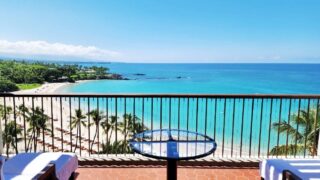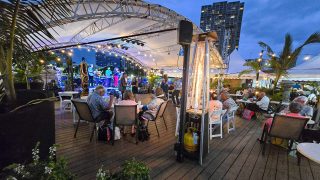One of Honolulu’s most unusual accommodations has been thrust into the global spotlight. Replete with its panoramic views, collaborative living spaces, and an atmosphere designed to foster creativity and community.
Surfbreak, in business since 2021, is a long-term stay option (2 to 12 months) that also calls itself a co-living and co-working community and has long been an appealing alternative for certain Hawaii travelers seeking something beyond the standard hotel. However, recent headlines involving Luigi Mangione, who stayed there from January to June of 2022, have brought unexpected publicity to this distinctly quirky option.
Surfbreak offers private bedrooms or suites with twin, queen, or king beds, desks, mini-fridges, and high speed wireless internet. Guests also have access to shared kitchens, social lounges, and community private-per-use bathrooms, adding to its unique appeal. Additional perks include a rooftop patio, conference facility, and even surfboards for guests’ use. Laundry service is available for a fee, and the prime Waikiki location is within walking distance of shops, restaurants, beaches, and bars—perfect for those who want to dive into Honolulu’s vibrant lifestyle.
What makes Surfbreak truly stand out is that it’s an accommodation that requires interviews. Yes, potential guests are said to be carefully vetted through an application process designed to ensure they align with the property’s community-focused ethos. It’s another quirky twist that fits its unique personality but now faces new scrutiny in light of recent events.
What makes Surfbreak unique.
Nestled near the iconic Ala Moana Beach Park and with a penthouse floor location, Surfbreak isn’t just about budget long-term Waikiki lodging—it’s an experience, and perhaps one that now carries an even more intriguing allure. Guests can book private rooms while sharing kitchens and workspaces, fostering a balance of privacy and connection. Rooms range from cozy twin options to king suites, with monthly rates averaging $75 to $150 per day, making it an economical choice for extended stays in Honolulu.
The guest experience is social and living in a community. This is not the place to come to stay in your room and do your own thing. Most guests are single, between the ages of 25-40 and working remotely.
Unlike traditional hotels, Surfbreak is selective about its guests, who go through what their website describes as “a thorough application process,” including interviews and background checks. This approach has helped Surfbreak maintain its reputation as a hub for creativity and collaboration.
The Luigi Mangione connection.
Luigi Mangione, who is now at the center of national news amid a high-profile murder investigation, stayed at Surfbreak during part of his time in Honolulu. While the property’s emphasis has always been on building a safe and supportive community. Could this incident prompt changes in how the property selects its guests? It’s a question many are asking as Surfbreak navigates the glare of perhaps unwanted publicity.
Why travelers choose Surfbreak’s Hawaii accommodations.
Despite the recent unwanted notoriety, Surfbreak remains a compelling choice for certain Hawaii travelers who desire both private rooms ensuring comfort and privacy, along with its community-focused aspect. Its proximity to popular attractions like Ala Moana Shopping Center, Waikiki Beach, and the rest of Honolulu still makes it a convenient base for exploring Oahu.
Many guests rave about the sense of belonging they feel during their stays, often describing Surfbreak as a “home away from home.” The property’s emphasis on sustainability, including eco-friendly practices and community initiatives, also appeals to conscious travelers looking to minimize their environmental impact while enjoying Hawaii’s natural beauty.
Does this change anything for alternative Hawaii budget accommodations.
The Surfbreak story underscores a larger trend in Hawaii’s hospitality landscape: the growing popularity of alternative accommodations, some at more reasonable costs. From spaces like Surfbreak to vacation rentals and small boutique hotels, travelers are increasingly seeking options that offer bespoke experiences, affordability, and a sense of connection. This shift aligns, at least in part, with Hawaii’s broader efforts to attract visitors who favor less traditional and more community-rooted experiences.
Surfbreak aligns, at least in part, with the Hawaii Tourism Authority’s mission to encourage visitors to have deeper, more meaningful experiences. By offering a community-focused environment and promoting connection with local culture, Surfbreak exemplifies alternative approaches to tourism that go beyond surface-level vacations, creating opportunities for guests to engage thoughtfully with the island’s unique spirit and give back through volunteerism.
However, the challenges faced by Surfbreak now serve as a cautionary tale. As Hawaii’s travel industry evolves, properties like this may need to revisit their practices to strike a balance between uniqueness and reliability—critical factors in maintaining trust and attracting new guests.
The future at Surfbreak.
For those considering a longer Hawaii stay and who fit Surfbreak’s profile, the accommodation provides an opportunity to experience Honolulu from a different perspective. As with any travel decision, however, it’s important to do your own research and ensure it aligns with your expectations.
Surfbreak embodies aspects of a growing trend reshaping the way people travel to Hawaii: the desire for accommodations that go beyond the ordinary. Its recent brush with controversy has brought new challenges, while also serving as a reminder of the complexities involved in creating unusual Hawaii accommodation spaces that are both welcoming and secure.
For younger Hawaii visitors, Surfbreak remains a symbol of what makes the islands compelling to this day: the chance to connect, create, and explore in a truly unique setting.
Get Breaking Hawaii Travel News







Now do Ryan Routh and his cozy shanti.
This might be a surprising concept for Hawaii, but this is a known, tried and true accomodation setup in San Francisco, LA, Chicago, Austin and New York. Several startup folks also do this. Early code sessions with Mark Z were like this in Palo Alto.
Surfbreak faces no challenges brought on by a gun toting nut who used their services,any more than
the bank,grocer,or library used by this person.
No one may have known of his plan,and no individual
is responsible other than this shooter.
Sounds like “Surfbreak” has some killer deals
😏Shoots!
From current news reports, Mangione’s background at the time of his stay at SurfBreak in 2022 would not have raised any red flags: an intelligent young man from an affluent family educated at a prestigious Ivy League university. Thus, I don’t believe the concept of SurfBreak’s accommodations will suffer, nor should their vetting process change.